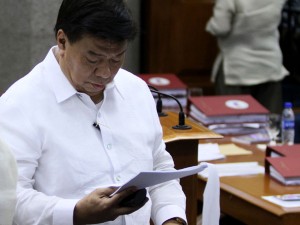Amending Epira high on Congress agenda–Drilon
MANILA, Philippines—Amending the Electric Power Industry Reform Act (Epira) to address the high power rates is part of Congress’ legislative package in the 16th Congress, Senate President Franklin Drilon said on Sunday.
Drilon and Speaker Feliciano Belmonte said they had recently drawn up measures to protect consumers and streamline tax incentives that would be prioritized during the remainder of the 16th Congress.
The goal of the measures is to encourage investors, scale up the business climate, boost market competition and create job opportunities, Drilon said.
He said both chambers would tackle bills amending the Epira amid the furor over the Manila Electric Co.’s (Meralco) record-high P4.15 per kilowatt hour power rate adjustment.
Calls for Epira’s amendment became strident after Meralco announced the rate hike in three tranches. In late December, the Supreme Court stopped temporarily the power distributor from imposing it.
Article continues after this advertisementMeralco was forced to buy power at a higher rate from the spot market after the Malampaya gas pipeline went on its scheduled shutdown from Nov. 11 to Dec. 10, which overlapped with the shutdowns of the power generators.
Article continues after this advertisement“Also of importance is the amendment to the Epira to find ways to address the woes of our people with regard to the high electricity rates, which the Epira was supposed to address,” Drilon said in a statement.
During the recent Senate hearing on the high power rate adjustment, Sen. Ralph Recto pushed for the establishment of a regulator for the Wholesale Electricity Spot Market (WESM) as an amendment to Epira.
Congress will also tackle legislation proposing a Consolidated Investments and Incentives Code of the Philippines, as well as a Tax Incentives Management and Transparency Act.
The goal is to ensure better handling of the country’s fiscal incentives for investors that would result in a business-friendly environment, Drilon said.
“There is a need to reassess and harmonize our numerous fiscal and nonfiscal incentives and subsidies to foreign and local investors to avoid overlapping and redundant incentives to cut unnecessary revenue loss,” he said.—TJ Burgonio
